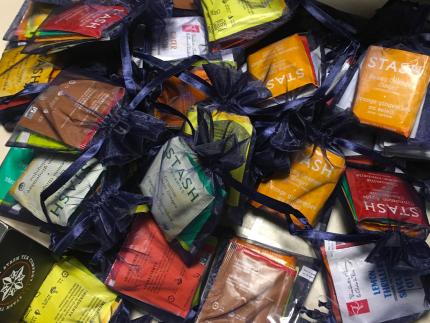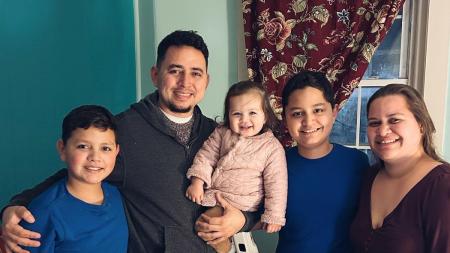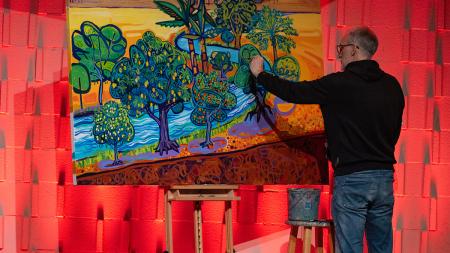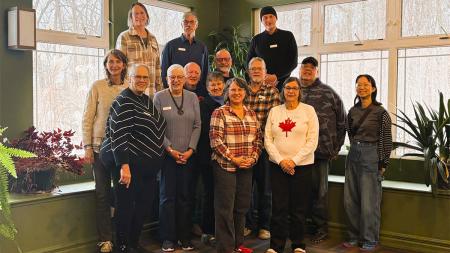Campus Ministry Connects in New Ways Amid COVID-19

Campus ministry is often about “being there” — not only sharing the good news about Jesus in words and worship services but also building Christian community, giving space for people to ask questions or share hurts, and facilitating times of recreation and fellowship.
In a time when social gatherings are restricted and people must keep their distance from each other because of COVID-19, ministry on campuses has had to change while aiming to continue serving student communities.
Mark Wallace, campus ministries leader for Resonate Global Mission, has heard from many campus chaplains about ways they have adapted since the pandemic broke out in early 2020.
He noted, “Our campus ministries have moved to focus on ‘What opportunities does the current pandemic provide for campus ministry?’ They are creative, exploring and discovering ways of joining in what God is doing in this time, bearing witness to the gospel, and living out the whole gospel in fresh ways both online and off.”
CRC News spoke with Sara DeMoor, a campus minister at the University of Guelph in southern Ontario, for a closer look at one campus ministry and how they have adapted to serve the academic community during the ongoing pandemic.
“[Campus ministry] is very much a ministry of presence, inviting people into community and following Christ in community,” said DeMoor. “When [the pandemic came on] in March, we essentially shifted whatever we had been doing and put it all on Zoom.”
Over the summer, though, she and others involved with Guelph Campus Ministry (GCM) had time to talk about some options. They considered what the needs and interests of students might be in this new context, and what could work in a distanced or online context.
To start, the ministry offered two Bible studies using an online conferencing app — one looking at the overarching narrative of Scripture, and the other exploring the theme of lament.
Because the campus ministry serves students from a wide variety of Christian and non-Christian backgrounds, DeMoor had noticed that many students knew that Jesus is important and there are some rules in the Bible, but they didn’t have a sense of the story the Bible tells.
“We read through the Old Testament looking at how God’s faithfulness to his people, amid the coventantal story, plays out. That worked pretty well on Zoom. I mean, we wished we could meet in person, but . . . we could screenshare different Bible project videos and things like that,” said DeMoor.
And the study of lament in the Bible was requested by a lot of the students in the campus ministry, she said, “given the context of COVID-19 and all the loss we’ve experienced. That was a powerful experience for those who attended. We studied Lamentations and Job.”
To encourage students to grow in their faith and to remind them that even when they’re separated from each other, they can always stay connected with God, the ministry also offered monthly spiritual practices around prayer and Bible reading.
At the beginning of each month, DeMoor explained, they introduced a spiritual practice or discipline, such as lectio divina — a close reading of a short passage of Scripture — and encouraged people to practice it a couple of times a week and get familiar with it. Then at the start of the next month, they would gather online to reflect on that practice and to learn about the next topic.
A variety of students have engaged in and appreciated the different things offered by GCM this year. In this new context, said DeMoor, it can be hard to know what’s going to find traction with students. With most classes online, students are tired of screens, and they don’t necessarily want more screen-based activity or interaction.
“They’re exhausted. Their eyes are sore. Their bodies are sore from sitting all day. . . . Even for their own wellness and spiritual wellness, I want them to be up and about and outside.”
To help encourage outside activity, and as a way to meet while respecting COVID-related restrictions, DeMoor began inviting students to walk and talk in either the university’s arboretum or in the students’ neighborhoods.
“Normally we would have been sitting with a cup of coffee or something,” she said, “but I find quite a bit of joy in finding safe workarounds — not in resisting rules that are meant to keep us safe, but in finding safe ways in which we can still really connect and in which I can still care for students.”
“All the students I’ve met with that way have really enjoyed it and have seen it as a great way of kind of ‘forcing’ them outside — and as a really good way to connect,” said DeMoor. “And that’s one thing I might actually continue after COVID restrictions are over.”
Earlier in the semester, when outside activities were easier and the COVID-19 case numbers were lower, Guelph Campus Ministry co-hosted a one-day, outdoor, distanced retreat. It was a way to get things started and to allow students to meet in person, at least for that initial contact, she said.
Over 25 students attended, said DeMoor, including some first-year students. That was a relief, she said, because she and other leaders at GCM had been wondering how new students would even find out about the ministry.
“But through Instagram and other means, we did connect with some first-years, and they came from up to two hours away, because they really wanted to meet people in person. . . . We had a really good first-time connection there,” said DeMoor.
It was at that retreat that Matthew Ypma, a first-year student at the university, joined the GCM community. Studying from his home near Tillsonburg, he was happy for a chance to meet other students, which, he said, is “next to impossible in my online-only classes.” A member of Crosspoint Community Church, he said, “I knew that most schools have a Christian group, so at the start of the semester I was definitely looking for a group like that where I could fit in.”
Ypma also appreciated the care packages that were delivered and mailed to many students connected to the campus ministry. In addition to being a fun and welcome surprise, the packages included paint and supplies for an online paint-night experience hosted by GCM leaders, to create more connection. Because of scheduling conflicts, Ypma hasn’t been able to attend many of the regular online gatherings, but he appreciates just being part of the group.
He noted, “I’m new to the university experience, so there’s that component as well as the pandemic. It has been a bit harder, but so far I’ve been managing. I know in the back of my mind that if I do need help, I can always reach out to Sara DeMoor, or to pretty much anybody in the Guelph Campus Ministry, and I know that I can be supported. I can clearly see God using GCM to help equip students with what we need, in order to share the gospel and live into our calling as students.”
Leah Hart is in her third year at the University of Guelph, and she said she appreciates the support provided by GCM as well. “We’re trying our best, students and professors alike, and although there is frustration and loss, there is also hope. . . . I’m so grateful for that kind of support GCM provides. Care packages, paint nights, small groups, and conversations with Sara are all meaningful details that have added hope to a difficult semester. I see God in the people around me who are loving and supportive even through the distance.”
Responses like these encourage DeMoor as she continues to find ways to reach out to the university community. Though there are times when her offerings seem small or when not a lot of people participate, she said, “I still try to be faithful in showing up and offering what I think God is calling us to offer. And I think that just the fact that we are doing things speaks volumes to students.”
Recognizing and appreciating the support that GCM and other campus ministries receive from Christian Reformed churches, DeMoor added, “I want CRC readers to know the deep commitment that campus ministries have — that their campus ministers have — to their communities and to their universities, and that we are still embodying a ministry of presence. It just looks different now.”


